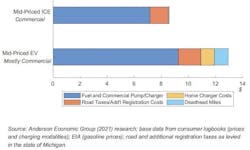A study of electric automobiles suggests the cost of fueling far outpaces the costs for fueling cars powered by internal combustion engines (ICE). The study by Anderson Economic Group in East Lansing, Michigan, aggregated costs including not only the actual energy, but the time required to fuel and the taxes included in fueling.
It found that the cost per 100 miles to fuel a mid-priced ICE automobile was $8.58, compared with $12.95 per 100 miles for a mid-priced electric vehicle.
The study, “Comparison: Real World Cost of Fueling EVs and ICE Vehicles,” included costs of EV fueling that Anderson said are not included in other EV studies. Besides the actual cost of the fuel, Anderson included four additional areas of cost: registration taxes, equipment such as chargers and the accompanying installation costs, so-called deadhead miles incurred driving to a charger or fueling station, and the cost of time spent refueling.
“Our analysis compares these costs for EVs and ICE vehicles, noting that some ICE vehicle expenses are bundled into the retail price of gasoline,” the reports states. “We provide a separate accounting of the direct monetary costs and time burdens for both sets of vehicles to generate a true apples-to-apples comparison.”
Key differences in EV fueling costs
- Fueling comparisons between EVs and ICE vehicles must account for all costs. The cost of fueling EVs and ICE vehicles include the cost of fuel (or electricity), as well as the cost of pump or charger, and road taxes levied on drivers. Most of these are bundled into the retail price of gasoline for ICE vehicles.
- The direct monetary costs of fueling EVs is often higher than for comparable ICE vehicles.
- Fueling costs vary much more for EVs than for ICE vehicles. This is caused by multiple factors. Commercial charger rates are often double or triple that of residential rates. Charging speed varies with the type of charger, level of charge in the battery, temperature, and working status of the charger. Pricing at commercial chargers may include a combination of per kWh, per unit time, and per session costs. This produces charging costs that vary considerably when calculated on a per kWh basis.
- Finding reliable commercial fast chargers, and waiting for EVs to charge, impose significant time costs on drivers. Even under ideal conditions, it takes substantially longer to fuel EVs than for comparable ICE cars.
Download the complete report from Anderson Economics.





